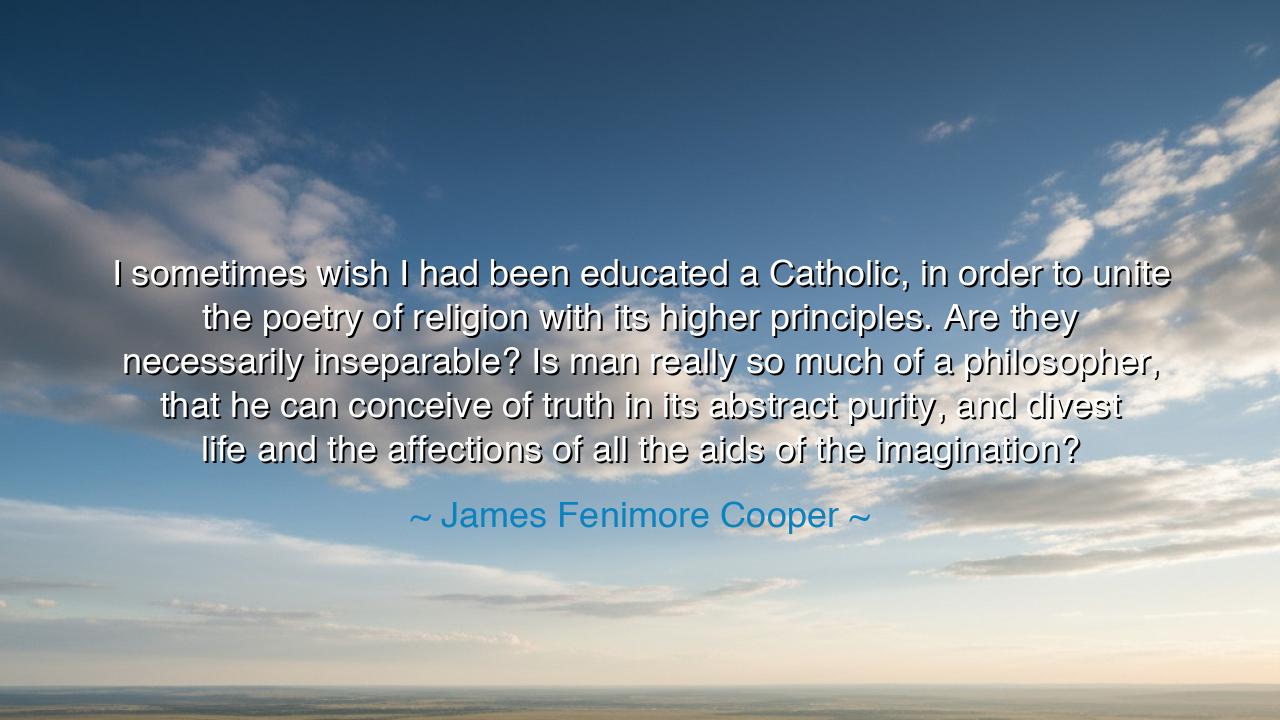
I sometimes wish I had been educated a Catholic, in order to
I sometimes wish I had been educated a Catholic, in order to unite the poetry of religion with its higher principles. Are they necessarily inseparable? Is man really so much of a philosopher, that he can conceive of truth in its abstract purity, and divest life and the affections of all the aids of the imagination?






“I sometimes wish I had been educated a Catholic, in order to unite the poetry of religion with its higher principles. Are they necessarily inseparable? Is man really so much of a philosopher, that he can conceive of truth in its abstract purity, and divest life and the affections of all the aids of the imagination?” wrote James Fenimore Cooper, the great chronicler of the American spirit, the teller of wilderness tales, and the seeker of moral beauty in a restless world. In these words, Cooper reflects upon one of the oldest tensions in human history — the struggle between faith and reason, between imagination and intellect, between the heart’s yearning for beauty and the mind’s hunger for truth. He does not condemn philosophy, nor religion, but laments that they have grown apart — that the poetry of belief has been exiled from the principles of the soul, leaving mankind dry, clever, and unsatisfied.
To understand this yearning, we must return to Cooper’s age — the early nineteenth century — when the Enlightenment had swept through Europe and America, enthroning reason as supreme, and casting suspicion on mystery, ritual, and wonder. The world was turning toward logic and progress, and the heart, it seemed, was left behind. Yet Cooper, though a man of intellect, felt the cost of this division. He admired the Catholic imagination — its cathedrals, its saints, its rituals, its art — for within these, he saw truth clothed in beauty. To him, poetry and faith were not rivals, but companions: one speaking to the intellect, the other to the soul. He asked, can truth live naked, without the garments of beauty that make it bearable to the human heart?
For indeed, man is not all philosopher. He hungers not only for what is true, but for what is meaningful. The ancients knew this well. When Plato spoke of truth, he did not offer only logic — he offered myth, allegory, story. He taught through images, for he knew that the imagination is the gateway to understanding. So too did the prophets and poets of every faith: they clothed divine law in parable and song, not to conceal truth, but to make it shine. Cooper, in his wisdom, recognized that imagination is not an enemy of truth, but its servant. Without it, faith becomes cold doctrine; without faith, imagination becomes wandering fancy. Together, they form the bridge between heaven and earth.
Consider the building of the Gothic cathedrals in medieval Europe — vast structures of stone and light, where art and faith united. They were not mere shelters for worship, but manifestations of imagination in service of divine principle. Every column, every window, every carved angel told a story — theology written in beauty. The men who built them did not understand abstract philosophy, but they understood awe. And through awe, they understood God. This is what Cooper mourned — the loss of a world where belief was also art, and where imagination led the mind toward reverence, not away from it.
He asks, “Is man really so much of a philosopher?” The question cuts like a quiet blade. Can any of us truly grasp truth in its “abstract purity,” without the aid of the senses, without the warmth of love, the pull of story, the majesty of symbol? The answer, Cooper implies, is no. Man is both mind and spirit, reason and dream. To strip truth of imagination is to starve the soul; to strip faith of reason is to blind it. Thus, he longed for a union — the poetry of religion joined with its higher principles, the harmony of beauty and virtue, so that the intellect might seek truth and the heart might adore it.
From this reflection comes a timeless lesson: the imagination is not a distraction from truth, but its companion and guide. Whether one seeks wisdom in scripture, philosophy, or art, one must remember that understanding is not achieved by intellect alone. A world that worships only reason becomes sterile; a world that worships only feeling loses its compass. The wise man, as Cooper saw, unites them both — he thinks deeply, but he also feels deeply. He builds cathedrals of thought, but he fills them with light.
So, let this be the teaching passed down: seek truth not only with the mind, but with the heart’s imagination. Read not only the arguments of philosophers, but the songs of poets. Let beauty accompany your search for meaning, for beauty awakens love, and love leads to understanding. Remember that life itself is both principle and poetry, both reason and reverence — and that man is happiest, not when he divests himself of imagination, but when he sanctifies it. For in that sacred union, truth ceases to be a cold abstraction and becomes what it was always meant to be: a living flame, both bright and beautiful.






AAdministratorAdministrator
Welcome, honored guests. Please leave a comment, we will respond soon